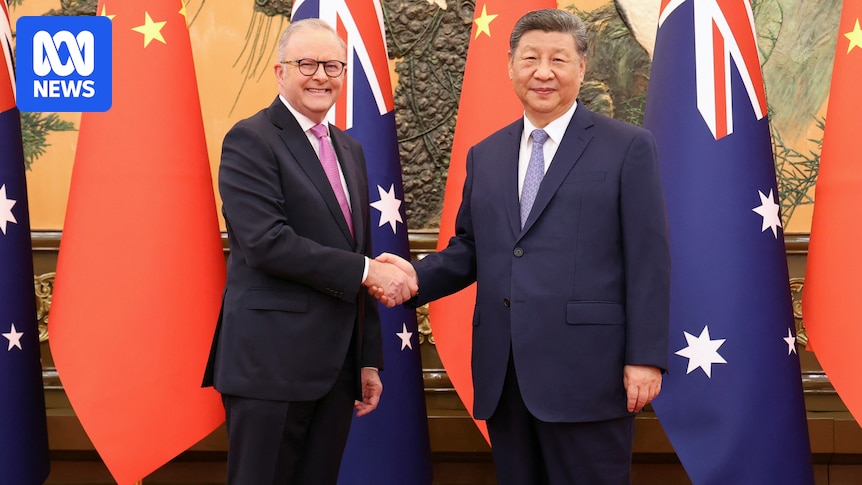The prime minister's visit to Beijing featured an unusual one-on-one meal with China's most powerful man. It's significant in more ways than one.
Why it matters
- The meeting between Prime Minister Anthony Albanese and President Xi Jinping signifies a pivotal moment in Australia-China relations, which have been strained in recent years.
- This one-on-one dinner highlights the importance of direct engagement between the leaders of the two nations, potentially paving the way for enhanced diplomatic and economic ties.
- The meeting comes at a critical time for both nations, as they seek to address mutual concerns and explore opportunities for cooperation in various sectors.
In a historic move, Australian Prime Minister Anthony Albanese dined with Chinese President Xi Jinping during his recent visit to Beijing, a meeting that is being hailed as a significant step in reviving the diplomatic relationship between the two countries. This rare instance of a private dinner between the leaders of Australia and China is seen as more than just a social engagement; it symbolizes a potential thaw in relations that have been marked by tension and disagreement in recent years.
Albanese's trip to Beijing marks the first official visit by an Australian prime minister to China in nearly four years, reflecting a growing recognition of the need for dialogue in the face of complex geopolitical challenges. The backdrop of this meeting is notable, as Australia has been navigating its foreign policy amid increasing regional instability and the need to balance its alliances with both the United States and China.
The dinner, which featured an intimate setting away from the usual formalities of diplomatic engagements, allowed both leaders to engage in candid discussions about a range of topics, from trade relations to climate change and regional security issues. This informal atmosphere provided an opportunity for both leaders to build rapport and foster a deeper understanding of each other's perspectives, which is often challenging in more structured meetings.
Observers are particularly interested in the implications of this meeting for trade, given that China is one of Australia's largest trading partners. The two nations have faced significant economic disruptions due to trade tensions and political disagreements, including tariffs and restrictions on various goods. By engaging directly, both leaders may be seeking to identify pathways to restore trade ties that have been strained over the past few years.
Moreover, the timing of this visit is significant as both countries are expected to address pressing global issues. Climate change, in particular, has emerged as a critical area for cooperation, with both nations acknowledging the importance of collaborative efforts to tackle environmental challenges. The leaders' discussions around renewable energy and sustainable practices may pave the way for joint initiatives, benefiting both economies in the long run.
The dinner also underscores the importance of personal diplomacy in international relations. By opting for a one-on-one meal, Albanese and Xi demonstrated a willingness to engage beyond the confines of traditional diplomatic protocols. This approach can often lead to more meaningful exchanges and a better understanding of each nation's priorities and concerns.
The implications of this meeting extend beyond the bilateral relationship between Australia and China. The outcome of these discussions will likely resonate throughout the Asia-Pacific region, influencing how other countries navigate their relations with both Australia and China. In a world where geopolitical alignments are constantly shifting, this renewed engagement could serve as a model for other nations seeking to resolve longstanding disputes through dialogue.
As the world watches the developments following this significant dinner, the broader narrative of Australia-China relations remains crucial. The potential for a diplomatic reset could lead to improved economic prospects and a more stable geopolitical environment in the region. In the coming months, the international community will be keen to see how the outcomes of this meeting translate into real-world actions and policies, as both nations work to rebuild trust and cooperation.
In conclusion, Prime Minister Albanese's dinner with President Xi Jinping is not merely a symbolic gesture but a strategic move that could redefine the future of Australia-China relations. It reflects a recognition that open communication and engagement are essential for addressing shared challenges and advancing mutual interests.











